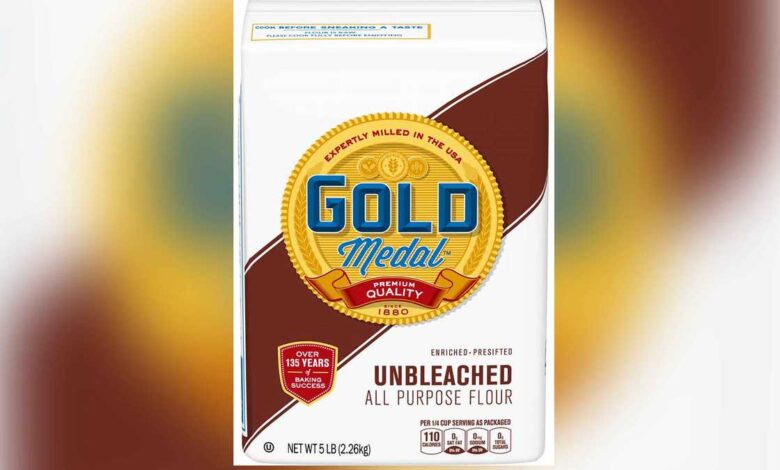
A salmonella outbreak linked to flour is over, but the CDC is still issuing this warning
A salmonella outbreak that was linked to Gold Medal flour is over, the U.S. Centers for Disease Control and Prevention said Wednesday. However, consumers should still make sure they don't have any recalled bags of flour at home.In late April, General Mills recalled certain 2-, 5- and 10-pound bags of Gold Medal Bleached and Unbleached All-Purpose Flour with use-by dates of March 27 and 28, 2024. The CDC says data showed that some Gold Medal flour was contaminated with Salmonella infantis bacteria that was responsible for at least 14 infections in 13 states. Nearly all of the patients interviewed reported eating raw dough or batter, and all of those who recalled the flour brand identified Gold Medal.A U.S. Food and Drug Administration investigation identified a single production facility for the flour that the sick people used, and an inspection of the General Mills facility in Kansas City, Missouri, turned up a sample with the outbreak strain of the bacteria."Although this outbreak investigation has ended, CDC advises you to throw away or return any bags of recalled flour and to wash any containers used to store recalled flour with warm water and soap," the CDC says.Salmonella infection typically causes diarrhea, fever and stomach cramps six hours to six days after consuming the bacteria. Most people recover without treatment in four to seven days, and because they aren't tested for salmonella, the true number of infections in the outbreak is most likely higher than what was reported, the CDC says. Some people – kids under 5, adults over 65 and those with weakened immune systems – may have more severe illness that requires medical treatment or hospitalization.Most flour is raw and hasn't been treated to kill germs that cause food poisoning, according to the CDC. Salmonella bacteria dies when it is cooked or baked, but people can get sick when eating or tasting foods that include raw flour. Raw dough used for crafts and play clay also pose a risk.The CDC advises baking or cooking any foods made with any brand of raw flour before eating. Thoroughly wash hands, bowls, utensils and surfaces after using raw flour. If making play dough at home, use heat-treated flour.
A salmonella outbreak that was linked to Gold Medal flour is over, the U.S. Centers for Disease Control and Prevention said Wednesday. However, consumers should still make sure they don't have any recalled bags of flour at home.
In late April, General Mills recalled certain 2-, 5- and 10-pound bags of Gold Medal Bleached and Unbleached All-Purpose Flour with use-by dates of March 27 and 28, 2024.
The CDC says data showed that some Gold Medal flour was contaminated with Salmonella infantis bacteria that was responsible for at least 14 infections in 13 states. Nearly all of the patients interviewed reported eating raw dough or batter, and all of those who recalled the flour brand identified Gold Medal.
A U.S. Food and Drug Administration investigation identified a single production facility for the flour that the sick people used, and an inspection of the General Mills facility in Kansas City, Missouri, turned up a sample with the outbreak strain of the bacteria.
"Although this outbreak investigation has ended, CDC advises you to throw away or return any bags of recalled flour and to wash any containers used to store recalled flour with warm water and soap," the CDC says.
Salmonella infection typically causes diarrhea, fever and stomach cramps six hours to six days after consuming the bacteria. Most people recover without treatment in four to seven days, and because they aren't tested for salmonella, the true number of infections in the outbreak is most likely higher than what was reported, the CDC says. Some people – kids under 5, adults over 65 and those with weakened immune systems – may have more severe illness that requires medical treatment or hospitalization.
Most flour is raw and hasn't been treated to kill germs that cause food poisoning, according to the CDC. Salmonella bacteria dies when it is cooked or baked, but people can get sick when eating or tasting foods that include raw flour. Raw dough used for crafts and play clay also pose a risk.
The CDC advises baking or cooking any foods made with any brand of raw flour before eating. Thoroughly wash hands, bowls, utensils and surfaces after using raw flour. If making play dough at home, use heat-treated flour.
Source link









